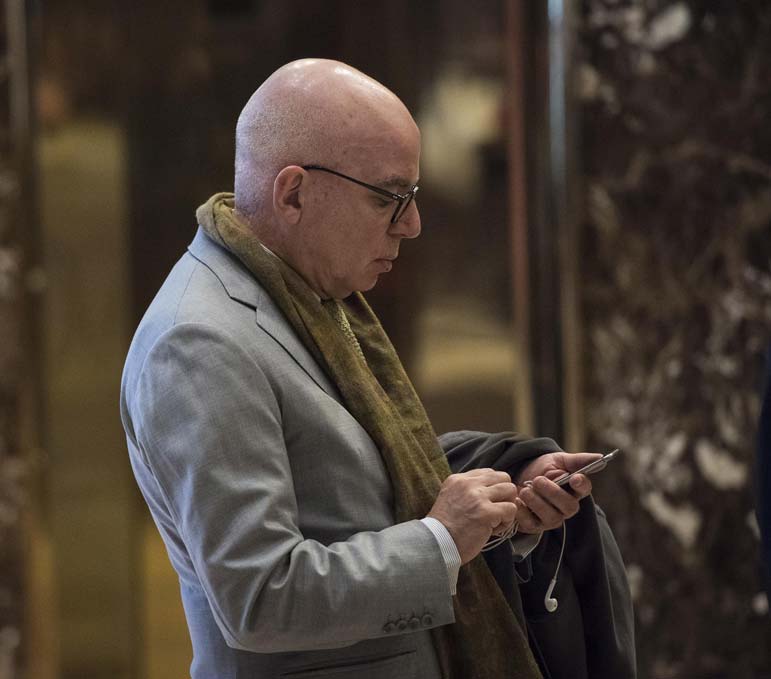 Michael Wolff seen in the lobby of Trump Tower. Washington Post photo by Jabin Botsford
Michael Wolff seen in the lobby of Trump Tower. Washington Post photo by Jabin Botsford
Author Michael Wolff bolstered President Donald Trump's effort to discredit the new book "Fire and Fury" on Friday when he acknowledged in a "Today" show interview that he had been willing to say whatever was "necessary" to gain access at the White House.
Wolff's admission does not directly undermine the veracity of his reporting, but it creates the appearance that he might have approached some members of the president's team under false pretenses, leading sources to believe that when they opened up they were speaking to a sympathetic ear. That's a bad look - one which the White House can use to impugn Wolff's integrity and, perhaps unfairly, cast doubt on whichever elements of his work the president doesn't like.
Here's Wolff's exchange with "Today" show co-host Savannah Guthrie:
GUTHRIE: Your former editor at Vanity Fair, Graydon Carter, said he wasn't surprised you'd written this explosive book; he was surprised they let you in the door at the White House. Are you surprised?
WOLFF: You know, um, no. I'm a nice guy. I go in . . .
GUTHRIE: Did you flatter your way in?
WOLFF: I certainly said what was ever necessary to get the story.
It's easy to find examples of Wolff saying things that would please Trump and his team - a theme being that other journalists are unfair.
On the morning after Trump's election, Wolff wrote in the Hollywood Reporter that "the media turned itself into the opposition and, accordingly, was voted down as the new political reality emerged." He scolded New Yorker editor David Remnick for calling Trump's win an "American tragedy" and wrote that "awe might have been in order."
A short time later, Wolff addressed fellow reporters in an interview with Digiday. "Let me send the message: stenographer is what you're supposed to be," he said.
After Trump's inauguration, Wolff accused the press of waging a campaign to take down the president. "The media's holy grail is, as it's been for much of the campaign, about what will stick," he wrote in Newsweek. "Of the myriad likely damaging possibilities, which one will be so prima facie damaging (pay no attention to the many instances that many people already thought were, or would be) or so shocking and insulting to the body politic that it will be the end, or at least the beginning of the end, of Trump? Nothing counts but delivering a mortal wound, so everything is delivered as though it is a mortal wound."
Interviewing counselor to the president Kellyanne Conway during an event at the Newseum in Washington, in April, Wolff said, "The New York Times, it seems to me, has a virtual beat. And in that beat, which often merits a front-page story, the beat is that President Trump is an aberrant president."
You get the idea. It would have been natural for White House aides to conclude, based on Wolff's coverage, that his book would turn out to be a favorable one.
"Fire and Fury" is not entirely inconsistent with Wolff's prior statements. He writes about what he calls the "mainstream media's self-righteousness and contempt for Trump," for example. Yet the book is a portrait of - to borrow the phrase Wolff applied critically to Times coverage - "an aberrant president."
Trump, perhaps feeling betrayed, tweeted on Thursday night that he "authorized Zero access to White House," claimed he "never spoke" to Wolff and accused the author of fabricating sources.
As Trump's responses to criticism often do, this one exceeded the bounds of reality. The president's own spokeswoman, Sarah Huckabee Sanders, said on Wednesday that Trump did speak with Wolff, though she claimed the conversation was brief. Wolff's regular presence in the White House has been well established by people who saw him, and there is no evidence that he made up sources.
But Wolff's acknowledgment that he "certainly said what was ever necessary to get the story" suggests some of his past coverage might have been dictated by strategy, rather than sincere belief, which opens the author to questions about the sincerity of his book, too.


 Contact The Editor
Contact The Editor
 Articles By This Author
Articles By This Author